-
 Korea.net's 24-hour YouTube channel
Korea.net's 24-hour YouTube channel- NEWS FOCUS
- ABOUT KOREA
- EVENTS
- RESOURCES
- GOVERNMENT
- ABOUT US
On October 10, recent films like "Whistle Blower," "Slow Video" and "Scarlet Innocence" were already playing at the Masil Cinema in Buan-eup, Buan-gun, in Jeollabuk-do (North Jeolla Province).
The intimate movie space was filled with the scent of nutty sweet popcorn and the spacious, cushioned seats would not be lacking in any big city cinema house.
It was unbelievable for visiting Seoulites, and even for locals, too, that they were actually enjoying the facilities. It was certain that movie-watching conditions had improved and that locals could now easily enjoy movies and could share happy conversations with their newly acquired conveniences. The faces of the movie-goers overflowed with expressions of happiness.
The closest multiplex movie theater was in the nearby city of Jeonju, taking over 40-50 minutes by car. While another small cinema was located in Gimje-si some 30 minutes away by car, it was hard to secure tickets there at the Jipyeongsun Cinema because it was often sold out.
The new Masil Cinema in Buan, however, has now also had consecutive sold out shows thanks to its grand opening, making locals reticent to plan a night at the movies in fear that it will be sold out. So to watch weekend movies, people show up three days early -- on Thursday or Friday -- to secure their tickets at the ticket booth.
The cinema's smooth road to success has many angles to it, as the cinema staff members tour local schools to promote upcoming feature exhibits. The staff have to convince the teachers that if they go to the theater, there will be tickets available.
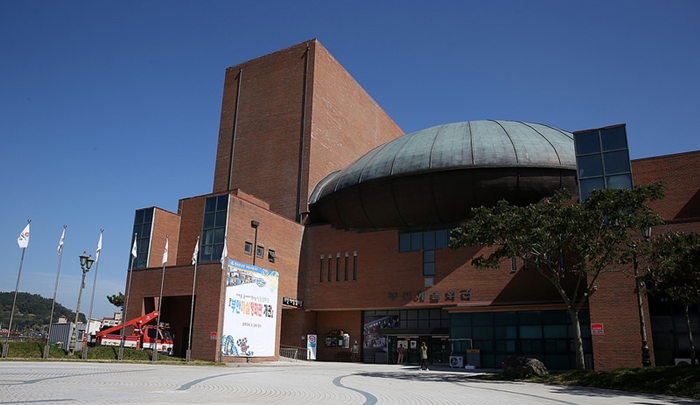
The Masil Cinema is located at the Buan Arts Center.
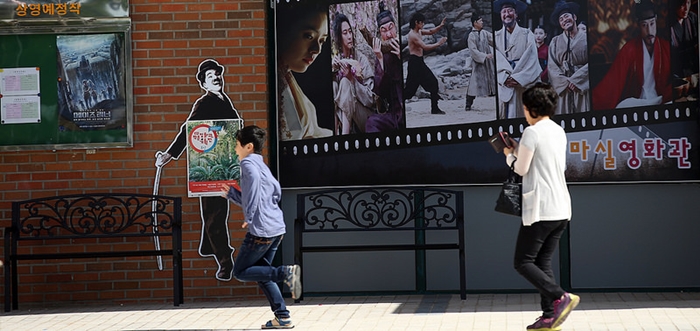
A mother and son head toward the entrance of the Masil Cinema.
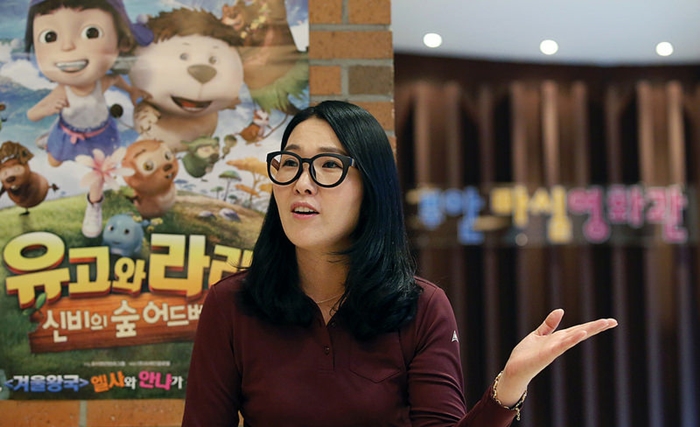
Bae Jin-gyeong is the manager of the Masil Cinema in Buan.
Buan's residents tend to enjoy domestic films rather than foreign films, especially comedies. Bae Jin-gyeong, the manager at the Masil Cinema, says, "Recent nation-wide hits like 'The Admiral: Roaring Currents' or 'The Pirates' had visitors coming to see them as many as 20 times. Regulars include staff of the Buan-eup local government, monks from some of the ten-plus local temples and teachers from the elementary, middle and high schools."
Even the town's notables, like the pastor, principal and fire marshal, have visited the establishment.
Bae also notes that, "Many people use a variety of transportation methods to get here: bicycles, motorbikes, trucks and more." She adds that, "Some visitors come from the nearby cities of Gimje or Jeongeup and even Gyeokpo, 40 minutes away. They all love the facilities at the Masil Cinema, and especially find the sound system to be enchanting."
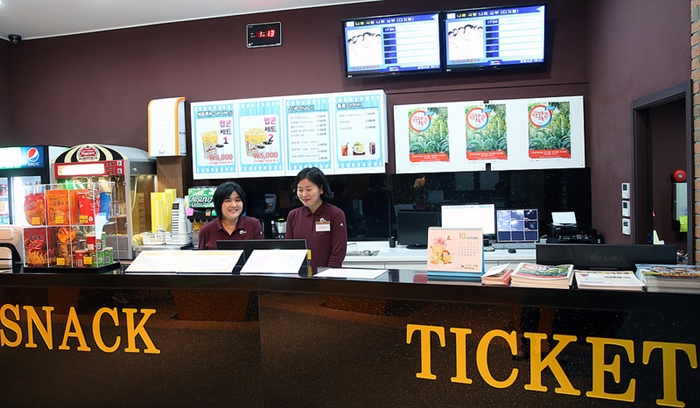
The ticket and snack counters at the Masil Cinema.
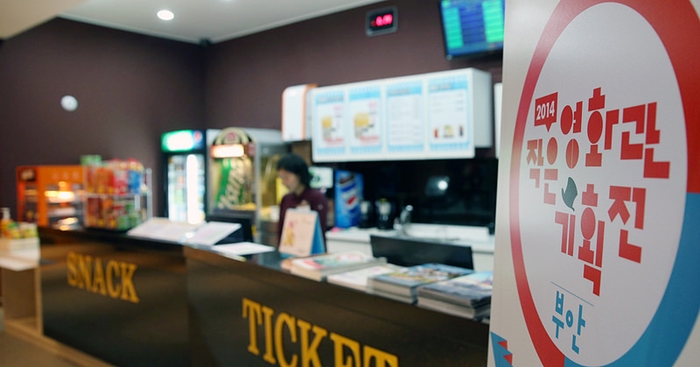
The Masil Cinema is preparing a small cinema feature exhibit.
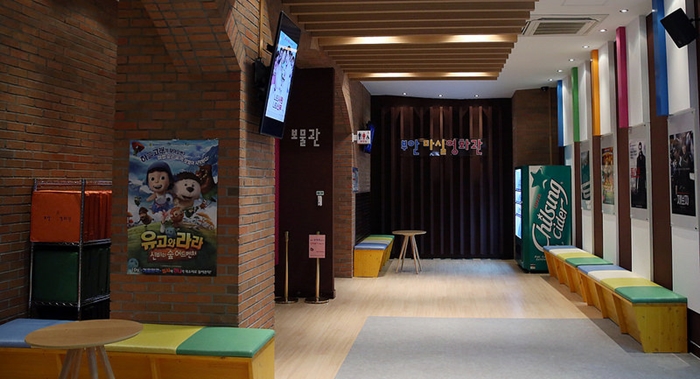
The entrance to the theater.
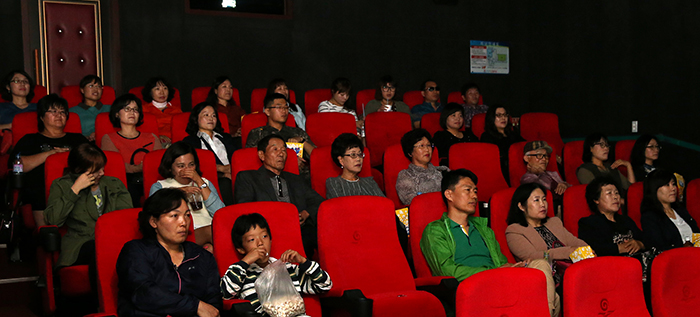
Buan residents are seen watching a movie at the Masil Cinema.
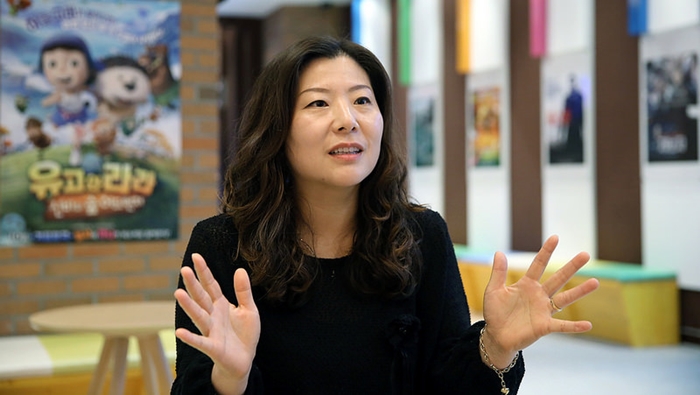
Moviegoer Lee So-hee says the greatest thing is to be able to watch a film with family and friends.
Here are some words from the movie-lovers at the cinema.
Lee So-hee, a mother of middle and high school students and a part-time elementary school music instructor, says, "Due to the newly opened cinema in town, our family can enjoy movies without having to make any reservations. Before, we had to set aside at least five hours to travel to the nearest multiplex cinema in Jeonju or Iksan, but now we can leave the house just five minutes before the movie's about to start. Even weekday evenings can be used to run down to the cinema," she added with satisfaction.
A former school principal, Jo Geon-gyu, says, "I can now watch a movie and spend time talking about it with my wife and friends. In the past, when we had to travel far to visit a movie theater, the distance itself and parking were a problem. Now, this cinema has none of those."
He also expressed anticipation over movies becoming a common conversation topic to bridge families that now live apart.
Lee said, "After getting married and becoming a wife and mother, I couldn't afford to hang out with my old friends. We would have to go to the next city over in order to watch a movie together. Since the cinema opened just five minutes away, however, I can now meet my friends, indulge in a movie and talk over cups of coffee afterward, which is really a nice change."
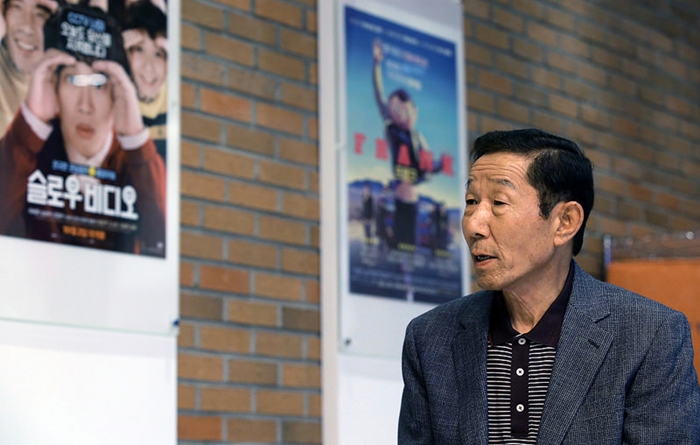
Former principal Jo Geon-gyu is happy that the cinema helps the community to grow closer together.
The Ministry of Culture, Sports and Tourism is the main supporter behind the "small cinema" support project. Content Industry Bureau Director General Park Younggoog says, "We hope that building state-of-the-art small cinemas in small towns will give people the opportunity to enjoy cinema and the arts and increase their access to certain cultural products. We will actively support the local governments with viable plans for new cinemas."
What is the small cinema support project?
As digital technology advances, cinematography is also making rapid strides. At the same time, the disparity between small cities in the provinces and larger cities is also growing. The former have fewer opportunities to enjoy performances or exhibits. This is particularly true for movies in the movie theater. Places where local residents can get together and watch a film are hard to come by.
The Ministry of Culture, Sports and Tourism provides financial aid to help build more such "small cinemas" in targeted regions in an effort to close the culture gap between those areas and larger cities. The small cinema project first started in October 2010 in Jangsu-gun, Jeollabuk-do. Last year, new theaters opened in Gimje-si and Imsil-gun, both also in Jeollabuk-do. This year, we saw theaters in Gochang-gun, Muju-gun and Buan-gun in Jeollabuk-do and in Hongcheon-gun in Gangwon-do (Gangwon Province).
This year, ten theaters were backed by central government support while twelve were backed independently by local governments. In total, 22 small cinemas will be in business this year. In 2015, plans are for nine more cinemas to open, all with central government support. Also, some 98 counties without movie theaters are set to open small cinemas in the future.
The central government can provide financial support when the local government acquires a target property and provides more than 50% of the total budget. The exact costs that can be covered by such financial aid are remodeling fees for the building and equipment costs, like cinema projectors. The operational expenses are to be covered by admission fees and concessions. Utilities and rent can be waved or reimbursed by the local government. Corporate funding is also possible. The theaters are either directly managed by the local authorities, run by a private party or else managed through a non-profit cooperative run by a social enterprise.
By Paik Hyun
Photos: Jeon Han
Korea.net Staff Writer
cathy@korea.kr
Most popular
- China warmly welcomes first Korea-born giant panda Fu Bao
- First hearing-impaired K-pop act hopes for 'barrier-free world'
- Novelist Hwang's 'Mater 2-10' shortlisted for Int'l Booker Prize
- Expats could account for 7% of population in 20 years: report
- Nat'l Fire Agency picks 137 elite staff for deployment abroad















